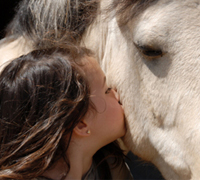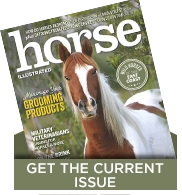 You would be hard pressed to find a little girl who would not be thrilled to have a pony. For some, an interest in horses is a passing fancy, eventually replaced by another hobby. For others, that first pony ride at the county fair is the beginning of a lifelong love of all things equine.
You would be hard pressed to find a little girl who would not be thrilled to have a pony. For some, an interest in horses is a passing fancy, eventually replaced by another hobby. For others, that first pony ride at the county fair is the beginning of a lifelong love of all things equine.
For most budding equestrians, the first step of horse ownership is riding lessons at a local barn where your child will learn how to safely lead, groom, tack up, and ride correctly. Many barns offer young riders opportunities to participate in horse shows, giving them a taste of the rewards and challenges of creating a winning partnership with their horse.
It is in riding stables and backyard barns where the echo of “I want a pony” often begins. While riding lessons are a great intro to the world of horses and a low commitment way to gauge your child’s true interest in horses, they typically do not teach your child everything he or she needs to be a successful horse owner.
Of course bringing a horse into your family will impact not only your child’s life, but that of your family. Being a successful owner requires a great deal of time, money and a lasting commitment to the care and well-being of your horse. The keys to a long-term, successful relationship with your horse are twofold: making sure you choose an appropriate horse for your goals, skill level and resources; and having the knowledge and understanding to properly care for your horse daily.
A great source to help families prepare for the realities, joys, responsibilities and challenges of horse ownership is The Humane Society of the United States’ Horses: Companions for Life program. For potential, new and veteran horse owners, the program gives access to information and resources they need to have a long, successful relationship with their horse.
The new book The HSUS Complete Guide to Horse Care is an indispensible resource where families can turn to understand what it takes to own a horse – as well as options like lease vs. buy… breeder vs. adoption and rescue, and more. It also looks at ways to have horses in your life but not necessarily own one! The HSUS wants people to understand that a horse, just like a cat or dog, is part of the family and deserves humane care for his entire life.
Here are some of the most important things to consider before adding a horse to the family.
- Does my child need a horse of her own? Riding lessons are a great introduction and a wonderful way for kids to develop confidence and learn responsibility. However, riding lessons do not give you all of the information necessary to be a horse owner. A good way to test the waters is by leasing a horse which typically involves paying a portion of the boarding costs for someone else’s horse in exchange for riding and care privileges. By leasing, you can get a better sense of how willing your child is to schlep to the barn in cold weather to make sure the horse has fresh water, or deal responsibly with sudden lameness or behavior challenges. If leasing isn’t an option, consider gaining some valuable hands-on experience by volunteering at a local horse rescue, therapeutic riding center or community stable
- Do we have the resources to care for a horse? Whether you keep your horse at home or at a boarding barn, basic care costs a few thousand dollars per year. In addition to food (hay and grain), water (8 to 12 gallons/day) and shelter, horses require regular hoof care, dental care, de-worming, vaccinations, tack and equipment and more. Training, lessons, transportation to shows, show fees and attire quickly add up. Horse owners must also be prepared to deal with injuries, illnesses and special needs as they occur. The purchase price is usually the cheapest part of having a horse. It is the ongoing financial outlay for care/training that can add up.
- How will we choose our horse? Horse shopping should be approached with the same careful consideration, thought and planning as buying a home or car. First-time horse owners should not foray into the world of horse shopping unassisted. A horse-savvy friend or teacher is a good resource as are the hundreds of horse rescue organizations across the country. These rescues take in adoptable horses from a variety of circumstances and match them up with appropriate adopters. Unlike breeders or trainers who stand to gain from selling a horse, rescues are primarily interested in ensuring the horse and rider are a good match. They have a variety of horses to choose from of all breeds riding ability and temperaments—and if a horse does not work out, they will typically take the horse back.
- Am I willing to provide a permanent home for our new equine companion? Horses can live well into their thirties, and many remain rideable well into their twenties. For a twelve-year old girl who wants her first horse or pony, a horse in late teens/early twenties would be an appropriate age. You never want to pair a young inexperienced horse with a young rider. Even if you choose a horse in his twenties, he could live an additional 10 years or more. Are you willing to provide care to the horse for the remainder of his life? If you cannot, are you willing to find another loving home for the horse? Many new horse owners do not realize that horses sent to weekly livestock auctions run the risk of being sold to middlemen for slaughter plants.
For more information visit humanesociety.org/horses_equines.
Frequently Asked Questions about Horse Companionship
An interview with Keith Dane, director of equine protection at The Humane Society of the United States in conjunction with the release of the book “The Humane Society of the United States Complete Guide to Horse Care”
Q: I ride horses and am thinking of owning one. Besides the money and time to commit involved what else do I need to know?
A: While riding lessons are a great introduction to the world of horses, being a horse owner requires a level of skill and knowledge you do not typically learn through riding lessons. Horses require care and commitment from their owners 365 days a year. A good way to learn about basic horse care and get some hands on experience is through leasing, or through volunteering at a riding stable, a therapeutic riding center or at a horse rescue.
Before making the leap to become a horse owner, you should ask yourself:
- Am I willing to take the time to learn basic horse anatomy and care before acquiring a horse?
- Do I have the time and financial resources needed to properly care for my horse?
- Why do I want a horse? For riding? For companionship?
- Am I willing to invest in training, avail myself of resources to have a successful relationship with my horse?
- Am I willing to care for my horse for the rest of his life? (Horses can live well into their 30s)
Q: What does it mean to “lease a horse”? How do you do that and who is the right person for leasing?
A: Leasing is a great way to enjoy the benefits of having a horse in your life without taking on the expense and responsibility of becoming a horse owner. Leasing involves having access to someone else’s horse for riding and companionship for a set period of time. The specific terms of leases vary, but typically involve the lessee paying a portion of the horse’s monthly board expenses in exchange for a certain number of days where they can ride or otherwise spend time with the horse.
Leasing is a great option for the horse enthusiast who wants to “test the waters’ of horse ownership, before taking the leap of purchasing their own horse. The ideal lessee would be someone who has taken some riding lessons, and is comfortable and confident around horses.
Q: Is there such a thing as adopting a horse rather than buying one?
A: Choosing a new equine companion is a big decision—one that takes time and effort. There are many advantages to adopting a horse vs. buying from a breeder. While breeders are focused on promoting their horses and ultimately selling them for a good price, horse rescue organizations are concerned with making successful horse-owner matches that will last a lifetime. Horse rescue groups typically have a wide variety of horses of all breeds and training ability and can help you choose a horse appropriate for your goals, level of ability and resources.
There are hundreds of wonderful riding and companion horses available for adoption at horse rescue organizations across the country. Just like with dogs and cats, horses at rescues come from all walks of life: some are former show or race horses looking for second careers and others are victims of neglect or abuse that have been rehabilitated. By adopting a horse from a rescue you are giving a horse a second chance at being a “Companion for Life”.
Q: How do you adopt a horse?
A: The process of adopting a horse is very similar to adopting a dog or cat from a shelter or rescue. The first step is to locate the horse rescue organizations in your state or community. There are more than 400 horse rescue organizations across the country, that have horses of all ages, breeds, colors, and riding ability available for adoption. The HSUS maintains a list of horse rescue organizations all over the U.S. (humanesociety.org).
Once you locate a rescue, you can make an appointment to visit with the available horses. The rescue staff will be able to show you horses that are appropriate for your riding level, goals and resources. If you find a horse you are interested in, the next step is to fill out an adoption application. Many rescues require a site visit to verify you are able to provide adequate living conditions for your new horses. After your adoption application is approved, you will be able to take your new horse home. Adoption fees vary, but are usually less expensive than buying a horse from a breeder.
Q: If I can’t find the horse I want through adoption, how do I find a reputable breeder?
A: Similar to dog and cat breeders, there is no governing body or regulatory agency for horse breeders, so finding a reputable one can be a challenge.
Qualities to look for in a reputable horse breeder include: a breeding program that emphasizes quality over quantity; one who is knowledgeable about each individual horse and has concern for the well-being of their horses, for the duration of their life. A reputable breeder won’t pressure you into buying a horse that is beyond your ability; will allow a trial period where you can test the horse to make sure it’s a good match; and is willing to take their horses back, at any time, should you no longer be able to care for the horse.
The best way to locate a reputable breeder is by asking around among local horse owners and trainers. Word-of-mouth recommendations is a common and proven way to find good services of all types in the horse community.
Q: What are the basic costs of owning a horse?
A: Adopting or purchasing a horse is usually the least expensive part of owning a horse. Horses need a large amount of food, space and ongoing care from a variety of professionals to stay happy and healthy. Costs include:
Board ($200- and up, per month): whether you keep your horse at home, or board him at a barn, your horse will require safe, fenced pasture for grazing, exercise and socializing; clean, well-ventilated shelter from the elements; food (forage, pasture and hay) and water. You will need a place to store tack, feed and other supplies and a safe place to ride and provide care for your horse.
Hoof care ($35-$200, every six to eight weeks): Horses require regular visits from a farrier to maintain healthy hooves. Many horses can go “barefoot” and just require a regular trim; others need shoes on all four feet, and some need corrective shoeing to maintain correct movement. In addition to visits from the farrier, horse owners need to clean their horse’s feet a few times a week to prevent disease and deterioration.
Vaccinations/Coggins test (approximately $100; two times per year): Just like dogs and cats, horses require vaccinations against diseases like Rabies, West Nile Virus, Influenza and other diseases. In order to participate in horse shows and travel across state lines, horses are required to have paperwork showing they are not carriers of Equine Infectious Anemia. The test for EIA, administered by your veterinarian, is called a Coggins test and typically costs around $25.
Other veterinary care ($50 and up, per visit): Horses, like dogs and cats, can injure themselves, suffer from allergies and infections, and ‘come up lame”, requiring a visit from a veterinarian for treatment. Equine veterinarians typically charge a “farm call” just to show up and evaluate your horse. Some ailments, like severe colic or injuries may require surgery at an equine hospital. Added to the cost of care at an equine hospital, is the cost of transporting your horse to and from the hospital.
De-worming ($8-$13, every six to eight weeks): Horses are susceptible to worms, and need to be dewormed regularly to avoid health problems. Your veterinarian can help you determine an appropriate worming schedule for your horse.
Training/equipment/supplies ($300 and up): If you plan to ride your horse, at the very least, you’ll need a saddle, bridle and saddle pads. If you plan to show, the costs rise significantly, as you will need show attire as well as tack for your horse. Even if you don’t plan to ride, you will need various grooming and first aid supplies for your horse.
Depending on your and your horse’s level of ability and your goals, you may need the services of a horse trainer. They typically charge by the hour, and fees can range from $35 and up.
Calculate your monthly and annual horse expenses.
Q: My daughter loves horses. How can we take her hobby riding to the next level and bring horses into our family life without the expense and time commitment of owning our own?
A: Leasing is a great option for young horse enthusiasts to have more access and time with a horse than weekly riding lessons allow, without having to incur the expense and responsibility of becoming a horse owner. While many young equestrians continue their love of horses throughout their life, and eventually become horse owners, for many, once they realize the time and financial commitment associated with actually owning a horse, their interest wanes and they move on to another hobby. By leasing, both the child and parents can get a realistic view of what it takes to be a horse owner, before purchasing a horse, and later regretting it.
Q: If we do move forward and own a horse, can we keep him on our property rather than at a stable or away from our house? What conditions are best for a horse’s home?
A: In order to be healthy and happy, horses require large amounts of space, food and water; shelter from the elements and companionship from other animals and people. Horses are very social, herd animals, so it is usually best to house your horse where he will have other horses to interact with. If it’s not possible to keep your horse with other horses, a pig or goat could provide friendship for your horse. How much space and the type of living conditions needed for a horse largely depends on the part of the country you live in. A general rule of thumb is to have one acre of land, per horse. Another important consideration when deciding to keep your horse at home or at a boarding stable is the daily care required by a horse. Unless you have the means to hire a barn manager, you will be charged with providing the daily care for your horse if he lives at home. At a boarding stable, the staff will provide for your horse’s basic needs on a daily basis, giving you greater flexibility and more time to spend riding and playing with your horse.
For more information visit humanesociety.org/horses_equines.
Learn more about choosing a horse rescue here.







Great article! Someday I hope to own my own horse, but right now we don’t have the room for one. These are good things to consider before adopting one.
Horses are worth every bit of thought and trouble necessary to keep them happy and healthy.
I’ve always wanted a horse but my parents have always said no whenever I asked because we can’t really afford it. Now that I’m older (I’m 19) I understand that taking care of a horse is expensive and I’ve accepted that at this time we can’t afford to have a horse. This article is great and very informative. Hopefully someday I will have a horse and this article will come in handy when that day comes.
Super article!!!
Very good article. Here’s an FYI for potential new owners (cost savings). You can get a year’s rotational wormer for your horse for about $25 from Country Supply online (or through catalog mail order) plus shipping. Paste wormers are relatively easy to administer and this is the best price that I’ve found.
informative
This is very informative! Love it!